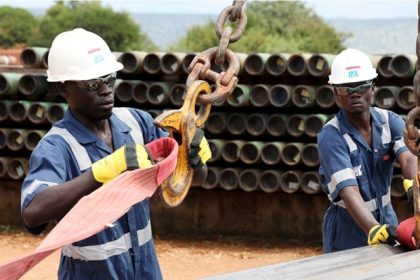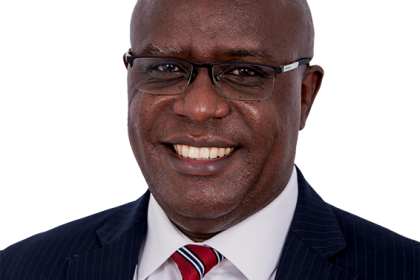Uganda economy still a toss of the coin despite S&P’s BB rating
KAMPALA, JANUARY 14- Standard & Poor Ratings Services projects that Uganda’s external financing requirements will rise by a significantly 14percent between the 2015 – 2018 window as the country ramps up infrastructure development amidst sluggish exports performance.
“We forecast that Uganda’s gross external financing requirements will average about 120 percent of current account receipts and usable reserves in 2015-2018, compared with 106 per cent in 2011-2014,” S&P said.
Uganda’s earning from exports have been declining due to a slowdown in the global economy in 2015 and low commodity prices. For instance Uganda’s exports declined 4.6 percent in the first quarter of fiscal 2015/16.
S&P says export performance remains weak because of low commodity prices, while volatile weather may negatively affect output in the agricultural sector.
“Although lower oil prices have provided temporary relief to Uganda’s import bill, we think the trade balance will remain weak, owing to capital imports related to the oil sector’s development and to infrastructure improvement. Consequently, we project that the current account deficit will likely remain at about 10 per cent of GDP over 2015- 2018,” S&P said.
“Over the same period, we project net external debt will represent about 85 per cent of current account receipts on average, which is substantially higher than the 41 per cent average in 2011-2014. Uganda’s rising external debt is predominantly linked to infrastructure development plans,” it explained
S&P states that they have trimmed projections for Uganda’s fiscal deficit for the 2015/2016 fiscal year (ending June 30, 2016) to 6.5 per cent of GDP from 7 per cent because the government has slowed the pace of its infrastructure investments while accommodating some election-related spending.
Despite the global economic slowdown, Uganda’s economic growth has been fairly high in this regard, S&P said: “Our revised GDP growth estimate of 5 per cent in 2016 is still high, compared with our previous projections of 6 per cent or more, taking into account the effects of monetary policy tightening and a smaller-than-expected fiscal stimulus filtering through to the real sector.”
Standard & Poor research analysis reveals that public investments have supported GDP growth and will continue to do so through 2018, notwithstanding the current drought, which is causing lower agriculture production. Public-sector-led hydropower projects (Karuma and Isimba) now under construction are expected to boost power supply in the medium term, thereby helping growth prospects.
However, investments in the oil sector have slowed due to lower international oil prices and government delays in issuing production licenses. We think the government will grant additional production licenses in 2016, while oil companies’ final investment decisions will likely follow in the second half of 2016, with production coming on stream only after 2019,” it explained.
Standard &Poor added: “Although we expect the Ugandan economy will grow by at least 5 per cent per year from 2016, we forecast per-capita GDP will rise by only about 2 per cent over 2015-2018 because Uganda’s population is increasing by 3 per cent per year. Due to the depreciation of the Ugandan shilling, GDP per capita will likely fall to $600 in 2016 from $700 in 2014.”
In its new rating, Standard & Poor’s Ratings Services affirmed its ‘B/B’ long- and short-term foreign and local currency sovereign credit ratings for the Republic of Uganda.
S&P explained: “The stable outlook reflects our view that Uganda’s infrastructure investments will yield higher growth over the next year and, in turn, this growth will moderate the country’s fiscal and external positions over time. Our stable outlook signals our view that there is less than a one-in-three probability of an upgrade or downgrade in the coming six months.”
Responding to the news this morning, the governor Bank of Uganda, Mr Emmanuel Tumusiime Mutebile said: “Standard & Poor’s Ratings Services affirmed Uganda’s sovereign credit rating at ‘B/B’ with a stable outlook. I am pleased to note that, once again, the external credit rating agencies share my confidence in the strong prospects for the economy over the medium term and in particular the prospects for robust economic growth and low inflation.”

 AfDB puts up nearly $700m for Burundi-Tanzania SGR link
AfDB puts up nearly $700m for Burundi-Tanzania SGR link
 Bank of Uganda keeps base rate at 9.5% to support surge in GDP growth
Bank of Uganda keeps base rate at 9.5% to support surge in GDP growth
 Africans must resist being bulldozed in energy transition timetable debate
Africans must resist being bulldozed in energy transition timetable debate
 Standard Bank Group appoints new Chief Executive for Uganda Holdings
Standard Bank Group appoints new Chief Executive for Uganda Holdings
 TradeMark Africa introduces new App to limit EAC trade barriers
TradeMark Africa introduces new App to limit EAC trade barriers
 Employer hiring up during November as Stanbic PMI rises to 53.4
Employer hiring up during November as Stanbic PMI rises to 53.4
